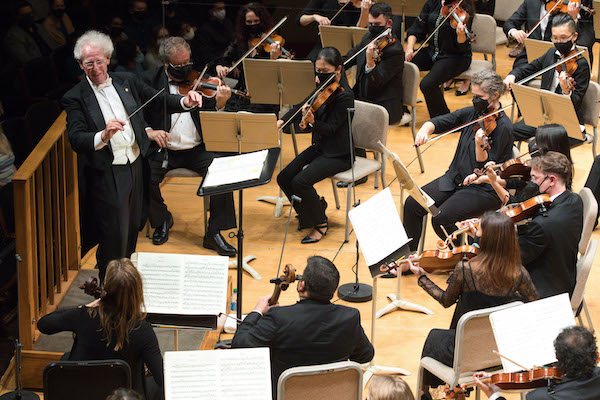Boston Philharmonic opens season with heaven-storming Bruckner

Benjamin Zander conducted the Boston Philharmonic in Bruckner’s Symphony No. 8 Friday night at Symphony Hall. Photo: Hilary Scott
Detractors persist in calling Anton Bruckner an eternal eulogist, a weaver of cumbersome works that echo the same ideas with little variation.
But that assessment obscures Bruckner’s unmistakable aesthetic. His symphonies fuse the secular with the sacred. Each conveys a timeless, heroic struggle from mystery and inner turmoil to triumph that can only come—in the composer’s view—through steadfast faith.
Conductor Benjamin Zander explored those heaven-storming qualities in Bruckner’s Symphony No. 8 with the Boston Philharmonic Friday night at Symphony Hall. Bold and beautiful, this season-opening performance proved a Bruckner experience to relish.
Conductors of the day deemed the epic Eighth, the last symphony Bruckner completed, as unwieldy. The criticism prompted a rewrite, though the composer largely retained the organ-like canvases and dense harmonic daring of the original 1887 version.
The symphony features Bruckner at his finest. Rich in melody and textural dimension, the score builds and releases its tension gradually over its 84-minute length. Like the Third and Seventh symphonies, the Eighth alludes heavily to Wagner. Yet the work ultimately unfolds like an extended organ improvisation, the freely shifting phrases always progressing in a clear direction.
Zander revealed this work to be a massive cathedral of sound, where orchestral lines arc in beautiful shapes. Soft and radiant, the opening figures seemed to grow out of a primordial mist. Strings and brass brought a dark resonance that only broke in the solo oboe line, which added faint light. Zander also drew attention to the accompanying passages—as with the bassoon and French horn sounding with warm resonance in the lyrical second theme. And horn and oboe calls injected verve to the bucolic third.
Yet the conductor always kept an eye toward the larger structure. His subtle rubato teased the urgency from every phrase, resulting in satisfying climaxes in the first movement. The orchestra erupted in powerful statements before the music returned to the delicate mists that marked the opening.
The Scherzo carried the tension forward. The fanfares and jagged statements that run through Bruckner’s thick orchestration never felt tethered in Zander’s reading, and the music moved with an impish lilt. The trio section offered tender contrast. Violins and solo French horn traded graceful echoes with the other, and brief chorales in the brass brought brief moments of solace, even solemnity.
Bruckner was a master of the symphonic Adagio. Zander coaxed a luxurious sound in the third movement that fully captured the music’s sense of repose and swells to grandeur that felt inevitable.
Moments of spare beauty lit the way. As the grand statements faded, violins, anchored by the orchestra’s three harps, held a chord that hovered in the air like light through a church window. Elsewhere, Zander worked like a painter, shading each chord from the horns and Wagner tubas with varying hues of darkness and light.
The finale brought firm resolution. In Zander’s hands, the sturdy march that makes up the bulk of the movement conveyed an existential struggle. Brass and string figures statements churned, faded, and rose again, coming to powerful conclusion in the symphony’s final bars. Zander’s reading ultimately oriented this religiously charged music to the sublime.
The conductor’s efforts were rewarded even before the concert began. Members of the Bruckner Society of America awarded him with the Bruckner medal—an honor previously bestowed upon Toscanini, Otto Klemperer, Erich Leinsdorf, and Jaap van Zweden. Given the resplendence of the ensuing performance, Zander, Boston’s greatest Brucknerian, is in esteemed company.
Benjamin Zander will lead the Boston Philharmonic in Mendelssohn’s Hebrides Overture, Brahms’ Symphony No. 4, and Prokofiev’s Violin Concerto No. 2 featuring Stefan Jackiw, November 10 at Symphony Hall. bostonphil.org
Posted in Performances